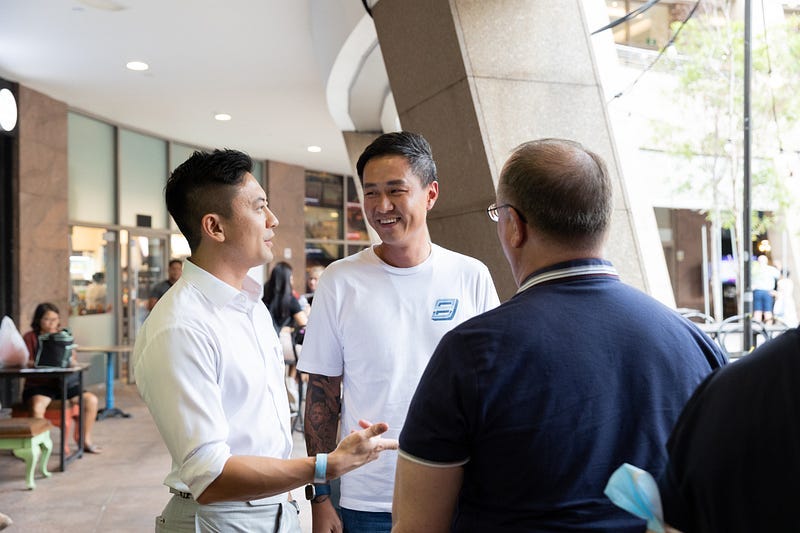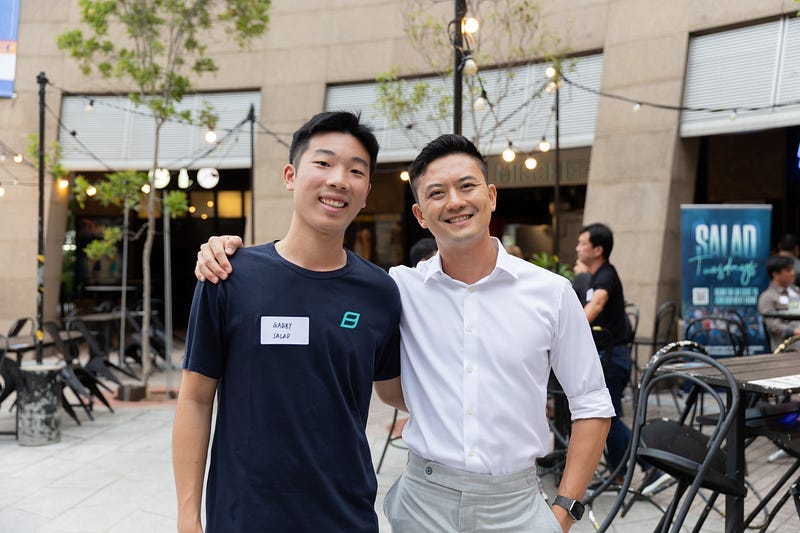Salad Spotlight: Daniel Chou
Not too long ago, play-to-earn was dubbed as the next-generation business model of gaming. The introduction of Web3 and blockchain…
Not too long ago, play-to-earn was dubbed as the next-generation business model of gaming. The introduction of Web3 and blockchain technology has allowed gamers to invest their time in gaming to earn in-game assets like NFTs and tokens with real-world value.
In this edition of Salad Spotlight, Daniel Chou of Mino Games offers some insights and a retrospective look at the play-to-earn economy; including how the economy has changed after the NFT summer last year.
Daniel is the Chief Creative Officer of Mino Games, a mobile games studio that produced “Mino Monsters”, one of the Top 50 grossing mobile games with over 13 million downloads. Mino Games currently has plans to venture into the Web3 space with an upcoming project that they are working on.
The Gaming Renaissance
Gaming, as a worldwide phenomenon, has shifted and adapted over the years through phases like “Pay to Play”, “Free to Play” and “Play to Earn”.
Even with the established Kings of the gaming space like Blizzard and Steam, this shift in the playing model has allowed smaller studios to gain some leverage in Web3 especially.
The beauty of Web3 is that it allows anybody to succeed. With new technology comes new innovation and blockchain games are no different. Web3 levels the playing field for any game studio and it gives those who focus on building communities a higher chance to succeed.
“Now we’re in Web3, it’s a different distribution platform. Who’s going to dominate it? We don’t know yet. But I feel that it won’t be a large corporation. I think it’s going to be a group with a strong collective of communities that are going to drive this wave.”
Shifting the Paradigm in Web3
Traditional play-to-earn games have been rewarding players with tokens that can be traded in real-time in the secondary marketplace. However, newer business models have seen play-to-earn games reward players with in-game assets like NFTs, which gamers find more desirable after the NFT summer in 2021.
Despite the growing popularity of NFT rewards, Mino Games aims to disrupt the meta with their Web3 project. Instead of rewarding gamers with one-off NFTs, Genesis holders of their NFTs will receive airdrops of exclusive in-game loots.
“We’re using the Genesis mint as a membership pass, and each pass will have different traits. Players will then hold different NFTs with different traits to receive exclusive airdrops of in-game content.”
This model builds on the existing battle pass mechanics that Web2 games are currently using as Genesis NFT holders and players can enjoy added rewards from the ownership of these assets.
Building a Brand; and Not Just a Game
Most GameFi projects choose to heavily focus on the tokenomics and reward system of their games so they often fail to build a strong player base and community.
Daniel agrees that the community should be at the forefront of everything. Developers should push updates that make the game playable for all demographics of their fan base.
At the end of the day, a game is at its core, a game. It should be fun and enjoyable for the players. When more players are onboarded, a community starts to form; and players can then identify with this community as they surround themselves with people who enjoy the game as much as they do.
“Games are really hard to build. It’s different from building a company or a brand. The proper way to monetize it is to not just build a really fun game but to build a brand and the corresponding community around it. That’s what keeps players.”
Creating Real Bonds and Opportunities
It’s no secret that Salad Ventures is a big believer in GameFi and naturally, Club Salad aims to connect everyone in the GameFi space together through our biweekly networking event — Salad Tuesdays.
Club Salad provides game developers, game designers, and more with a curated IRL platform to help Web3 buidlers come together and value-add each other.
“Club Salad events are really well curated, and that has really expanded what Mino Games can do here in Singapore by expanding our connections. You’re able to connect people in GameFi with different specialities with one another and that adds value to projects.”
Web3 is a new and growing space and networking events like Salad Tuesdays are not only for GameFi professionals but for everyone in Web3 looking to first add value before receiving some.
“Even outside of GameFi, Club Salad has connected me with people I need to expand. I’ve connected with development studios and venture capitalists outside of GameFi to really expand and build.”
What’s Next?
Daniel believes that Web3 is not the only novel technology in today’s market and there will be an up-and-coming competitor for Web3.
“There is a lot of technology that took off, but it wasn’t always that one technology alone. My question is: What is the competing technology that is going to take off in confluence with Web3?”
Find out what our next guest has to say about competing technology in Web3 in our next edition of Salad Spotlight.
If you wish to be featured as one of our guests on the Salad Spotlight, be sure to mint our Club Salad Access Pass. You can also enjoy exclusive access to our events in 2022, early updates to future Salad Ventures’ projects, and more.
We are excited for what’s coming, so make sure to not miss out on the next event by connecting with us:
Club Salad Access Pass (Genesis Edition): https://events.salad.ventures/club-salad-nft-access-pass/
Salad Tuesdays: https://events.salad.ventures/salad-tuesdays-sg/
Join our Salad Tuesdays Telegram Announcement Channel: https://t.me/+h7Cy_YOeFZg3YWY1
Twitter: https://twitter.com/realclubsalad
Instagram: https://www.instagram.com/realclubsalad/
Discord: https://discord.gg/saladventures
Let’s meet IRL, and buidl together!




